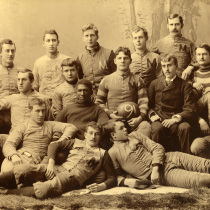Snapshots of U-M History

Celebrating George Jewett
A look at the achievements of Michigan’s first African American football letterman.
By Rachel Reed and Greg Kinney
To help celebrate U-M’s Bicentennial, the Bentley continues its series of stories about “firsts” in Michigan’s history, including U-M’s first African American football letterman.
Intelligent, driven, and athletically blessed, George Jewett was a classic all-American: He’d been valedictorian of Ann Arbor High School. He’d captained both the football and baseball teams there—as well as the debate club. He was the fastest sprinter in the Midwest, and could hold a conversation in four languages.
He was also an African American, living during the time when Jim Crow was tightening its grip on the country.
Jewett, the son of a blacksmith who came to Ann Arbor around 1868, came to the University of Michigan in 1890, enrolling in the Lit School, but hoping to study medicine. By all accounts, he was well-liked, and an excellent student. But his stellar academic record is overshadowed by his athletic achievements. Jewett was Michigan’s first black football player and ultimately one of its greatest stars. In just two seasons, 1890 and 1892, he started as both a fullback and halfback, and was Michigan’s top scorer, rusher, and kicker during his reign. He was both a terror on defense, and an outstanding runner on offense. Some who saw Jewett play believed he should be ranked with Heston and Harmon among Michigan’s all-time greats.
Later, his former teammate Ralph Stone would recall that although Jewett was modest and friendly off the field, when he played, he possessed a strength far beyond expectation: “Without the benefit of blockers to clear a path for him, he could dodge, wriggle, twist, pivot, and whirl through the opposing team, as well as the modern number-one, All-American back could do with the help of a mighty bulk of human flesh to block for him,” Stone wrote in 1954. A newspaper during Jewett’s time described him as “a brilliant player who stands punishment with indifference.”
In a particularly memorable game with Oberlin’s undefeated 1892 team—coached by the legendary John Heisman—Jewett scored four of Michigan’s touchdowns. As was the practice of the day, teams agreed that the game would end at a specific time—in this case 4:50, which would allow Oberlin time to catch their train. With the visitors holding a two-point lead, Oberlin claimed time had expired. Michigan, however, argued that there were still minutes left on the clock, owing to unaccounted for time-outs during the match.
As Oberlin’s players celebrated and left field, Michigan centered the ball and Jewett walked it to the end zone unopposed, winning the game for Michigan 26-24. (Oberlin, to this day, still claims to have won the game.)
Despite his prowess on the field and in the classroom, Jewett’s skin color did not go unnoticed. Jewett’s teammate Roger Sherman recalled an incident from the 1890 game at Albion: Jewett’s presence “was resented by both the Albion team and the spectators.” Albion tried to lure Jewett into a violation that would get him thrown off the field. At one point he was charged with “slugging” and “the cry went up from the crowd ‘Kill the n—-.’ The crowd surged on the field, blows were struck, and a riot was in the making when the local police intervened.” Jewett stayed in the game and helped Michigan to a 16-0 win.
Jewett was not enrolled in 1891-92, but returned in 1892 to lead the Wolverines to a 7-5 record. Jewett then ran afoul of Medical Dean Victor Vaughn who insisted he could not play football and attend Medical School. So Jewett took his talents to Northwestern and became the first African American to play for that school. He starred for the Wildcats for two years and earned his medical degree.
Jewett practiced medicine in Chicago for a time, but soon returned to Ann Arbor. He coached briefly at Michigan Agricultural College and Olivet and then pursued a variety of jobs and businesses, including a dry cleaning business on State Street. Jewett died suddenly in 1908 at age 38, leaving a wife and two young sons.
As for Wolverine football, it would be exactly 40 years before another black player was awarded a varsity letter.
